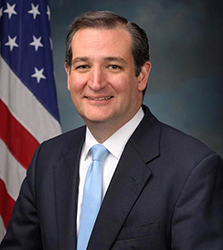
Could Cruz and Rubio Be the Last 2 Standing?
A growing number of political and media observers are suggesting that the GOP nomination could come down in the end to a battle between two freshmen senators, Ted Cruz of Texas and Marco Rubio of Florida. Two stories this morning take up the theory, including this from Politico:
The coming fight between Marco Rubio and Ted Cruz
The two Cuban-Americans, both 40-something, first-term senators with tea party credentials, continue to trail outsider candidates Donald Trump and Ben Carson in the polls. But they’re increasingly viewed as the candidates to beat in their respective lanes — Rubio as the new establishment front-runner and Cruz beginning to consolidate support from the party’s more conservative wing. The consensus view that they outperformed their rivals Tuesday has served only to cement that impression….
The two didn’t spar much in Tuesday's debate, but from Cruz at least, the subtext was clear — both during the debate and in his interviews afterwards — as he broached two subjects perceived to be Rubio vulnerabilities: immigration and support for sugar subsidies.
The article notes that before Cruz can get in position to be the main rival to Rubio, he has to overtake retired neurosurgeon Ben Carson in the crucial early state of Iowa:
Next week, Cruz will ratchet up his presence there: Cruz’s campaign has dropped $140,000 on television airtime in three Iowa markets starting next week. A super PAC backing Cruz, Keep the Promise III, also appears to have reserved air time from Nov. 16 to Nov. 24, according to a media tracking source, for one-minute spots to run in the same three markets.
It’s the latest salvo from the Cruz campaign in an intensifying effort to compete hard in an early state where Cruz’s conservative message can take root. An August religious liberty rally marked a big public kickoff, and since then Cruz has been a frequent visitor as part of his promise to visit all of Iowa’s 99 counties. The Texas senator has hit remote parts of Iowa and attended higher-profile events, such as a recent pheasant hunt with prominent conservative Rep. Steve King, whose son is involved with the Iowa arm of a super PAC backing Cruz.
A robust field organization is already taking shape. Cruz has campaign chairmen, his campaign says, in every county in each of the first four states. The senator and his father, Pastor Rafael Cruz, are also working to procure endorsements from pastors in each Iowa county as part of his plan to consolidate the evangelical vote. Cruz will again be in the state Nov. 20 for a gathering of Christian conservatives headed by prominent activist Bob Vander Plaats.
The New York Times has a similar article this morning highlighting the competition between the two for conservative voters:
Both men are essentially fighting over a pool of voters that neither can lay claim to at the moment: higher-educated and more religious conservatives who are now mostly supporting Ben Carson, the retired pediatric neurosurgeon who largely failed to distinguish himself on Tuesday on a stage full of candidates who were far more fluent in domestic and foreign policy….
While Mr. Cruz and Mr. Rubio have similar, reliably conservative, voting records (Mr. Cruz has a 100 percent rating from Heritage Action for America; Mr. Rubio earned 93 percent), they could not be more different in the way they have positioned themselves. Mr. Cruz sees his path to the nomination coming by solidifying the support of the far right. Mr. Rubio aims to build a broader Republican coalition while recognizing that he cannot afford to appear too moderate and risk alienating the party’s core voters.
The Times piece also explains the sugar subsidy issue that Cruz apparently intends to use, along with immigration, to distinguish himself from Rubio as a true free market believer:
Mr. Cruz knows that his path to the nomination will be less encumbered with Mr. Rubio wounded, and he tried to do so several times in the debate without mentioning him by name.
In an exchange that probably went over many viewers’ heads, Mr. Cruz criticized a subsidy program for sugar producers that Mr. Rubio supports — a position that has earned the Florida senator scorn recently from fiscal conservatives, most notably The Wall Street Journal editorial page. Unprompted, Mr. Cruz raised the subsidy issue, calling it “corporate welfare” and vowing to eliminate it.
By not tangling directly with Rubio on the sugar subsidy issue, Cruz smartly avoided what was almost certain to be a well-rehearsed and probably highly effective rebuttal, similar to the Florida senator’s response to former Florida Gov. Jeb Bush's attack on his Senate attendance record in the third debate.
Both Cruz and Rubio have been fairly consistent conservative, free market advocates (Cruz has his deviations as well, most notably opposition to the Trans-Pacific Partnership free trade deal), and both are formidable communicators. While a Cruz vs. Rubio contest may or may not be the final matchup for the GOP nomination, the two are likely to find themselves competing for many of the same voters as the process continues, and whoever gets the upper hand is almost certain to be one of the final contenders if not the nominee.



